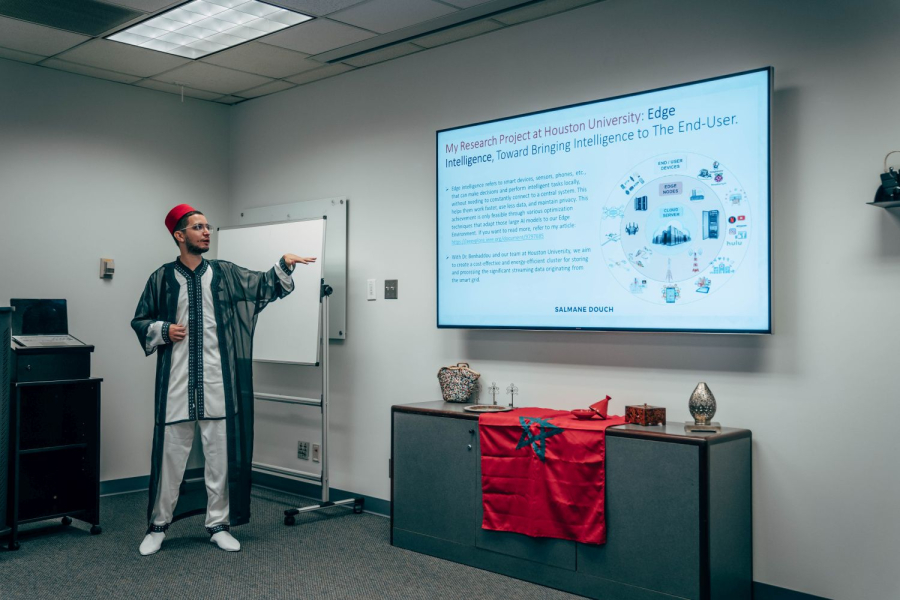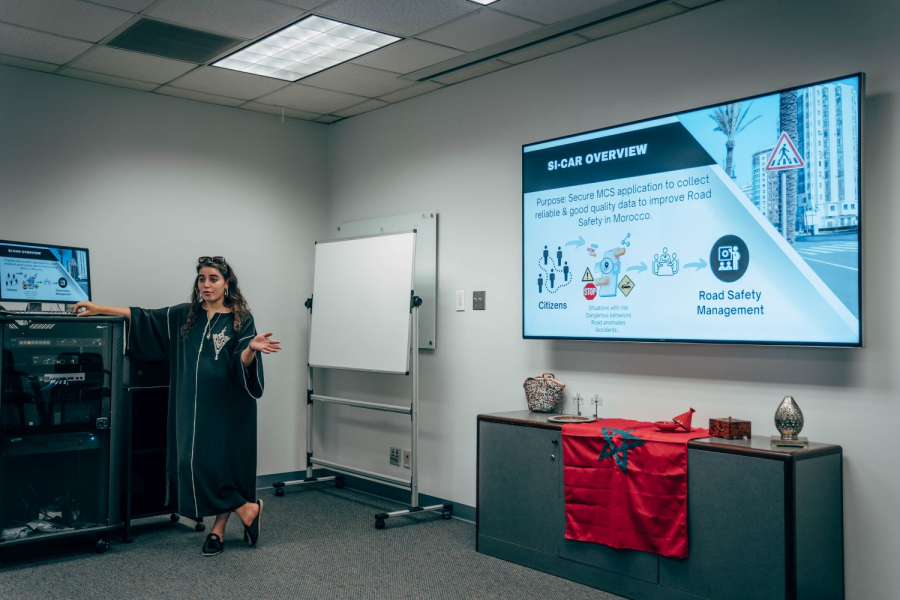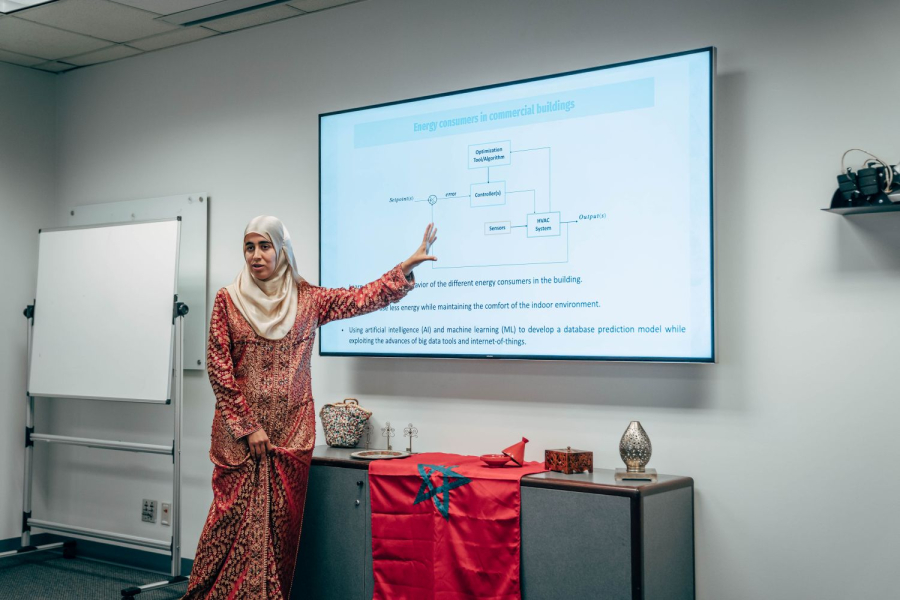Technological innovation is a multi-faceted, globally driven landscape, with the sharing and exchanging of perspectives vital to growth, success and honing the cutting edge. This semester, the Technology Division is proud to be hosting three Fulbright awardees from the kingdom of Morocco in Driss Benhaddou's Wireless and Optical Networking (WON) lab.
Just before the start of the Fall semester, Benhaddou and scholars Wiam Ayrir, Salmane Douch and Hajar El Gadi hosted a Fulbright Cultural and Academic Event for faculty and staff. Here, awardees had the opportunity to introduce themselves, their home country, and their projects and research scopes to their new University of Houston colleagues. Attendees were also treated to a presentation covering the history, culture and industry of Morocco, plus a spread of traditional sweets and the serving of Moroccan tea – a gesture of hospitality, friendship and goodwill brought from across the Atlantic Ocean.
Wiam Ayrir, PhD – Assistant Professor, University Ibn Tofail, Kénitra, Morocco
In her home country, Ayrir works as an assistant professor in the Department of Electrical Engineering, Networks and Telecommunications Systems at Université Ibn Tofail in Kénitra, and has done so for the last two and a half years. Here in Houston, she will spend the next three months working with Benhaddou on developing AI-managed HVAC control systems that strike an ideal balance of comfort and efficiency for large commercial buildings.
"I discovered that these systems consume more than 30 percent of the energy we are using – it's so much waste," she said. "In supermarkets, hospitals and other large places, these systems are usually run on maximum [occupancy] scenarios, even with just one or two people in the building."
It's a tall order to complete in three months, but Ayrir remains hopeful.
"The period is so short. I hope that we can manage to find the suitable system, and we can at least perhaps simulate it. Of course, I will continue on that when I go back to my country, and hopefully get another chance to test this system in reality – in the building itself."
So far, she has enjoyed her time settling into Texan life.
"As a person who loves traveling, I've traveled to Europe many times and I think the mindset here is so different. People here are just respectful. Muslim women, especially those who wear hijab, face a lot of difficulties and racism sometimes in many European countries. In some countries they are not even allowed to study or work with their Hijab. Here, nobody cares about your clothes or beliefs. Even in the streets, people are just nice. They say hello, how are you doing, have a nice day. You feel that people respect you as you are."
Salmane Douch – Ph.D. student, University Mohamed V, Rabat, Morocco
Douch has just begun the third year of his Ph.D. studies and is also working with artificial intelligence. His research in the WON lab aims to adapt very large AI models – such as those used for natural language processing – that are currently run on large data center computers for use with smaller devices like cell phones.
To avoid the security concerns of running these models and their data through the cloud, Douch wants to finesse the techniques in use to allow them to run locally on the smaller devices that need them.
"Data is very valuable these days," he said. "It's a present risk and a future risk. You can be identified from that data. Your data can be linked together to find out where you are, what you are doing and so on, which can be very dangerous."
"There is so much very valuable information on the Internet in terms of learning and getting an education, so it doesn't matter so where you are if you want to learn. But to apply those techniques, you need financing. You need to develop that big unique project and pitch it to companies that want to fund the next generation of infrastructure intelligence, and they need to have funds to give, so the US is probably the best place in the world to be when it comes to AI-related development."
"I'm so excited," Douch added. "I've already met some wonderful people – very high achieving and excellent people here. And I'm also looking forward to participating in different conferences, to share my knowledge with others too and to learn from them as well. Everything about this experience will help me grow as a person, both for my cultural experiences and also as a researcher."
Hajar El Gadi – Ph.D. student, University of Mohamed V, Rabat, Morocco
El Gadi, now in the fourth year of completing her Ph.D., aims to support the Moroccan Ministry of Equipment and Transportation with her project to improve road safety and reduce transportation-related accidents and mortality rates. She plans to accomplish this through increased public involvement, reporting and data collection.
"This is an application that will involve citizens in collecting data regarding roads, such as anomalies, high risk areas, or accidents. That information will then be sent to the authorities," she said. "The stakeholders will analyze that data to better understand and make decisions to enhance road safety in Morocco. We're now in the phase of developing the application with a focus on data security and access control, incentive mechanisms and incorporating crowd sensing via mobile phones. We’re leveraging gamification to motivate citizens, because we know for a fact that it really motivates them, and we need to make sure that we have a secure system as well."
"Sometimes it's overwhelming because we started from scratch. We had to think about every single detail. For me, it's like my little baby. This year I've finally started my real thesis, and I'm focusing on the security aspects of the platform: developing an access control model. Sometimes it's overwhelming, but it's a good experience. I really love getting to have new experiences; that was my main goal in coming here. I could have done this work back home if I'd wanted to, but having a new experience in another world, in another culture, another country, another perspective while advancing my project… That is what I really wanted."
For a photo gallery, click here!
![The Technology Division is proud to be hosting three Fulbright awardees from the kingdom of Morocco in Driss Benhaddou's Wireless and Optical Networking (WON) lab. [Left to right] Wiam Ayrir, Hajar El Gadi, Salmane Douch, and Driss Benhaddou, associate professor in the Department of Engineering Technology. The Technology Division is proud to be hosting three Fulbright awardees from the kingdom of Morocco in Driss Benhaddou's Wireless and Optical Networking (WON) lab. [Left to right] Wiam Ayrir, Hajar El Gadi, Salmane Douch, and Driss Benhaddou, associate professor in the Department of Engineering Technology.](/sites/ccoe.egr.uh.edu/files/images/news/2023/group-crop-01_0.jpg)


